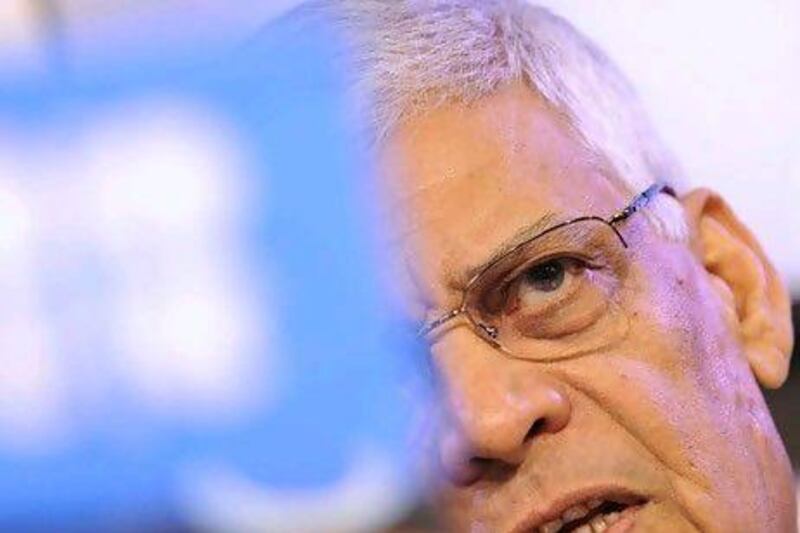The price of oil fell last night after the secretary general of Opec voiced concern over falling global demand, and the euro-zone debt crisis deepened.
Editor's Pick: The big business stories making headlines today
UK seeks role rebuilding Libya The UAE teams up with the UK and a number of leading businessmen to assist the rebuilding of economies hit by the Arab Spring - with video. read article
Capital flight from Egypt and Libya hit $8 billion during Arab Spring Capital flight from Libya, Egypt and Tunisia topped $8.6 billion in the first quarter of this year, according to a new report from the Bank for International Settlements - with video. Read article
Nakheel's $16bn bond faces test Nakheel's new Islamic bond is falling in price, sending yields skyward. Read article
The price of crude dropped by as much as 3 per cent in London and New York as investors speculated over the likelihood of Greece defaulting on its sovereign debt and digested a series of negative remarks by Abdalla El Badri at a meeting in Dubai.
The Opec chief warned western nations needed to do more to bolster their economies and stem unemployment or they risked jeopardising billions of dollars in oil investments.
"It's really hampering the demand for oil," he said. "That stimulus package is not really working. Something must be done to introduce new manufacturing, new activities [so the West] can solve its unemployment."
Producers and consumers alike have lowered their forecasts for oil demand growth over the next two years amid the grim economic outlook.
Crude oil for October delivery declined US$2.84, or 3.23 per cent, to $85.12 a barrel in early trade on the New York Mercantile Exchange. Futures have lost 6 per cent this year.
Brent crude for November settlement dropped $3.16, or 2.82 per cent, to $109.06 a barrel on the ICE Futures Europe Exchange in London.
"Crude has been knocked down on a combination of Greek concerns and bearish comments out of Opec," Matt Smith, a commodities analyst with Summit Energy Services in the US, told Bloomberg News. "Concerns about Greece are causing the euro to sell-off hard and the secretary general of Opec came out with a double whammy on production cutbacks and demand growth."
Opec, which supplies 40 per cent of the world's oil, pumps about 30 million barrels per day (bpd). Member countries are investing $312 billion (Dh1.14 trillion) over the next five years to bring 21 million bpd to the market, Mr El Badri said, and they needed to be assured that those barrels would be required by talking with China and the US about their future energy needs.
"The consequence is this $312bn is shooting into the dark. Maybe that new production will never go to the market," said Mr El Badri. "Thirty million [barrels] is not like this bottle of water, you just open and pour it. A lot must happen to bring oil to the market. You have to spend a lot of money."
Mr el Badri, who served as the chairman of the Libya's National Oil Company during three stints from 1983 to 2006, estimated the Opec member country could regain its pre-conflict pumping levels of 1.6 million barrels per day (bpd) within 15 months.
Oil infrastructure appears largely undamaged but computers and smaller technical instruments critical to production could have been looted or damaged, he feared.
"I am afraid of what happened in Iraq," said Mr El Badri. "In Iraq there was a lot of instrumentation lost. And those instruments you cannot really buy them from the shop.
"You must have security. You must have access to spare parts. You have to mobilise the entire oil industry towards that target."
Gulf countries, which increased production to make up for the loss of Libya's light, sweet crude, will lower pumping to keep markets in check, he said.
"I can assure you when Libya comes back, our member countries will reduce production," said Mr El Badri. "I don't have to talk to member countries, I don't have to talk to anyone. Things will settle themselves."
Opec is next scheduled to set pumping policy in December, its first meeting since the acrimonious discussions in June when Saudi Arabia and Iran clashed over whether to increase the group's production target.
After the meeting in Vienna, Mr El Badri announced the group's 12 members had failed to reach consensus.
"This meeting is forgotten and when we meet in December, you will not hear these kind of statements again," he said this week. "At the end of the day, it is the most important income for oil countries. We have to protect it."





